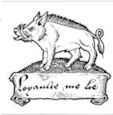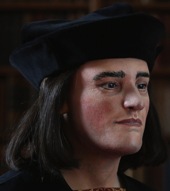Following the reference to Cerne Abbas by Sir Frederick Treves in his book Highways and Byways of Dorset, Ricardians will be interested in this comment about another Dorset village.

Bloxworth Church (© Copyright John Lamper and licensed for reuse under this Creative Commons Licence.)
Sir Frederick, after some kindly comments about the little church in the village of Bloxworth, goes on to make some not so kindly ones about one of its former rectors.
A very famous rector of Bloxworth was John Morton, Cardinal Archbishop of Canterbury in the time of Henry VII. For a prelate, he led a most adventurous life, not without the usual episodes of imprisonment in the Tower and flight to Flanders. He comforted Edward IV when that king lay dying, and was the stoutest advocate of Henry’s marriage to Elizabeth of York, whereby the red rose and the white became blended in the rose of Tudor. As Bishop of Ely he takes his part in Shakespeare’s play of Richard III, wherein occurs “the incident of the strawberries”, as described by Sir Thomas More, once a page in his household.
Describing how the Duke of Gloster [sic] had asked Morton for some strawberries from his garden at Holborn, Sir Frederick tells that the Bishop replies, ‘Gladly my lord quoth he, would God I had some better thing as ready to your pleasure’.”
Sir Frederick’s comment: “These are indeed ready words for a crafty plotter like the Bishop, who wished the Duke of Gloster [sic] to perdition, and who had no “better thing” in store for him – if he had his way – than the dungeon or the headsman’s axe.”
Bibliography:
Sir Frederick Treves, Bart. GCVO, CB, LL.D, Highways and Byways of Dorset. Macmillan & Co. Ltd, 1906. No ISBN.
Tags: Contemporaries, Richard III
 When earlier this year archaeologists made the discovery of the true location of the Battle of Bosworth public, they showed various artefacts that led to the discovery. One of them, and for me the most fascinating and poignant one, was a small silver boar badge. The White Boar was Richard’s emblem and badges like this would have been worn by his knights. They were primarily awarded at ceremonies like Richard’s coronation or the investiture of his son as Prince of Wales. It is believed that this one was lost from the tunic of one his knights as he fought alongside his rightful king against the usurper Henry Tudor. Read the rest of this entry »
When earlier this year archaeologists made the discovery of the true location of the Battle of Bosworth public, they showed various artefacts that led to the discovery. One of them, and for me the most fascinating and poignant one, was a small silver boar badge. The White Boar was Richard’s emblem and badges like this would have been worn by his knights. They were primarily awarded at ceremonies like Richard’s coronation or the investiture of his son as Prince of Wales. It is believed that this one was lost from the tunic of one his knights as he fought alongside his rightful king against the usurper Henry Tudor. Read the rest of this entry »


